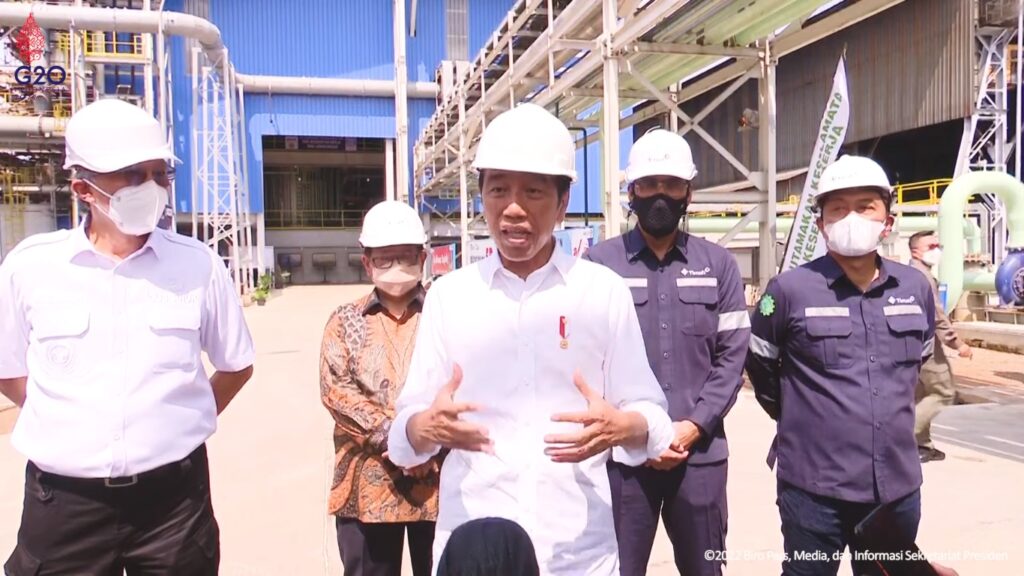Mind the Gap: Viable Injustice in Indonesia’s Energy Transition

Nickel Downstreaming in Indonesia (Cabinet Secretary/2022)
One of the remarkable achievements of President Jokowi is the launching of the Just Energy Transition Partnership (JETP) during the Group of Twenty (G20) in Bali back in 2022. With its commitment to the Paris Agreement, Indonesia has enacted Law No. 16 of 2016, committed to reduce greenhouse gasses emissions by 31.89% or 43.2% by 2030, and progressively created regulations governing renewable energy (Presidential Regulation No. 112 of 2022, Ministry of Finance Regulation No. 103 of 2023, and Comprehensive Investment and Policy Plan under JETP).
Moreover, Jisman P. Hutajulu, the Directorate General of Electricity – Indonesian Ministry of Energy and Mineral Resources, stated that discussion about the New Energy and Renewable Energy (EBET) Bill will continue after the presidential election. However, the critics about political will for Indonesia’s just energy transition in this Bill have been stimulating in different institutions, particularly from think-tanks and Non-Governmental Organizations (NGOs).
Moreover, with a long list of regulations and partnerships in energy transition efforts done by the government, foreign governments, and private sectors, Indonesia has been more ambitious in cutting carbon emissions to reach net zero by the end of 2060. This ambition has two side-effects in the country, which also accelerate the challenges of just energy transition efforts.
One of the main challenges links to the fragmented power and capacity of the actors in policy coordination and implementation. While the national government oversees institutional arrangements and regulatory frameworks, local governments are in charge of regional energy planning and development, e.g. Rencana Umum Energi Daerah (RUED) or General Region Energy Planning, including the components for project implementation. Yet, policy inconsistencies and lack of political will at every level remain. Moreover, despite a strong political rhetoric of decentralization for increased inclusivity in decision-making, institutional challenges, such as corruption, lack of capacity, low transparency and good governance, impede the process.
Social inclusion, promoting increased local participation, has often been integrated in the narratives of energy transition, owing to the recognition of socio-cultural challenges in the process. For instance, extensive media coverage and research have shown how the expansion of renewable energy projects disrupt some indigenous cultural landscapes and thus, encounter community resistance. Hence, indigenous rights, cultural acceptance to the land use, and cultural preferences of the introduced new technologies must indisputably be taken into account.
Moving on to the economic challenges, besides the need for sound financing support, energy transition projects also spark concerns for local regions with income-dependency on fossil fuels, not to mention the informal sector that grows in the surrounding mining environment. Amidst state’s and private sector’s mixed signals on transitioning due to the high cost of renewables and potential income losses, strategies must be explored also not to reproduce socio-economic injustice towards the precarious labors and affected vulnerable groups in the mining sector.
In this scenario, energy transition evolves into a matter of justice, benefitting from perspectives rooted in climate justice. As a movement and concept, climate justice seeks to address the disproportionate impacts of climate change and the unequal distribution of burdens and benefits of transition to a sustainable, low-carbon future. “Just transition” must not merely be an emerging popular global narrative but demands a robust monitoring mechanism to guarantee that vulnerable groups do not suffer the consequences of land use changes and the energy industry shift. Their rights should be protected during the shift to a low-carbon economy.
Confronted by those glaring challenges and envisioned goals, we must scrutinize whether prevailing energy transition narratives unduly favor investor-consumer dynamics, overlooking the production process which involves the welfare of precarious workers in the supply chain. In our critical examination of this shift towards sustainability, we must consistently ask “Who truly benefit(s)? Who is/are perpetually conditioned to bear the sacrifice?” These concerns demand urgent attention in ongoing discussions about “nickel downstream” in Indonesia.
Nickel downstream should be thoroughly monitored and evaluated because it potentially harms both local communities and the environment, such as human rights violations, deforestation, and pollution. A common concerning issue is the systematic exclusion of local contributions in the planning and analysis of the environmental impact assessment (AMDAL), leading to land grabbing without due consent and fair compensation. Notably, poverty rate in nickel downstream areas (West Nusa Tenggara, Central Sulawesi, North Sulawesi, Southeast Sulawesi, South Sulawesi, Maluku, and North Maluku) and Gini index have increased from 2022-2023. For instance, according to the Central Statistics Agency (BPS), the poverty rate in Central Sulawesi from September 2022 to September 2023 had increased from 388,360 to 395,660 people, respectively.
Aside from consulting local communities, a solid collaboration between academia, government, business or private sector, civil society organizations, and wider citizens is imperative to drive downstream efforts for a just energy transition. Collective knowledge sharing and co-production with a well-defined contextual framework and a set of legal standards regulating this collaboration are two essential steps to address this issue.
Indonesia’s energy transition journey is at a critical juncture, where justice and sustainability intersect. As investors wield influence over transition decisions, their commitment to sustainable practices becomes pivotal. However, the discourse often solely emphasizes climate change, neglecting the rights of vulnerable groups affected by the shift. Promoting Environmental, Social, and Governance (ESG) criteria for sound investment aligned with sustainability goals and ethical considerations is undoubtedly necessary to address socio-environmental concerns. Simultaneously, capacity building and inclusive co-production of knowledge are vital for successful implementation. The “downstream” model, highlighting domestic extracting, processing, distribution, and marketing, is indeed shaping the national energy sector’s future. Yet, its implications—whether hindering or facilitating sustainability—must be carefully examined. To prevent the local communities near energy production sites from repetitively bearing (again) the brunt of these changes, inclusive policies and decision-making are necessary. By studying case examples across sectors, such as nickel and palm oil industries, supporting transparency and accountability in the process and governance, Indonesia can navigate toward a just energy transition that balances economic growth, environmental protection, and social equity.





